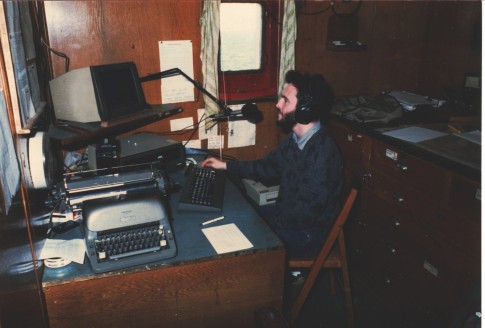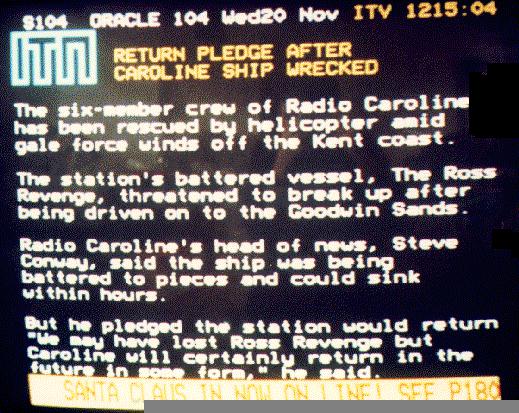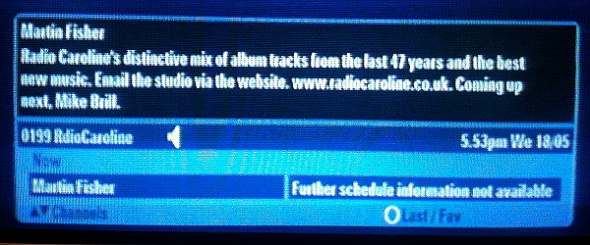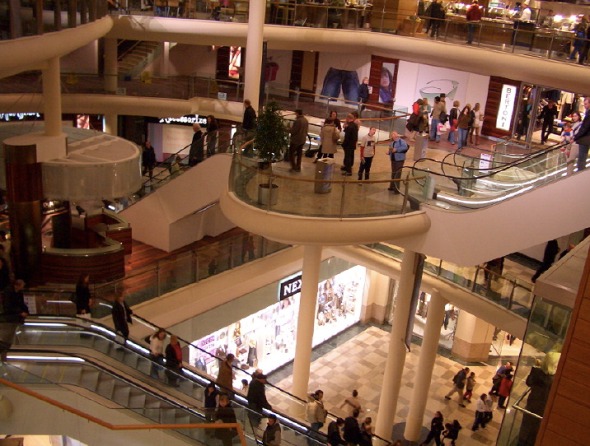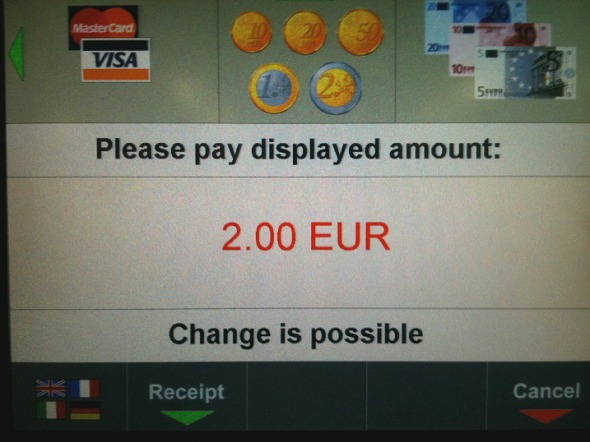String Theory: My Quarter Century As “Steve Conway”
Posted: February 24, 2012 Filed under: 1980s, 1987, broadcast engineering, Newsreading, offshore, Radio Caroline, Ross Revenge, Shiprocked!, Ships, Smartphones | Tags: 1987, Change, Information, life, Pirate Radio, Radio Caroline, String, Technology, Time, Travel 2 CommentsI think it was John Denver who sang the words “He was born in the summer of his 27th year, coming home to a place he’d never been before” (the song: Rocky Mountain High)
As Steve Conway I was born on the 6.30am news headlines exactly 25 years ago this morning, in the winter of my 23rd year, having just arrived at a place that would become home to me for a number of exciting drama and emotion packed years, and a sort of Tir Na Og or mystical lost land for me to look back at later in life.
This is a way of saying that today is the 25th anniversary of my joining Radio Caroline back in the days when it was offshore. Before that that day I had another name, but the practacalities of working on a radio station that was outside the law (not against the law, but actually outside it) made a name change advisible, and so Steve was born as a fully fledged adult, and Steve I have been ever since.
And, in a way, it was a rebirth of sorts, because joining Caroline so radically altered my life that the date 24th February 1987 is a dividing point in my life, which was very very different in shape either BC (before Caroline) or AD (after the drifting of November 1991 that ended my offshore years).
And what of the 4 years in the middle? They were, in a way, outside normal time and space – life on board a pirate radioship in International Waters being so strange and cut off from normal society, but so physically, socially, and emotionally intense that those involved seem to exist in their own little bubble. For a proper detailed description of those strange years, I would refer you to my 2009 book: Shiprocked – Life On The Waves With Radio Caroline, and my forthcoming prequel, sequel and midquel “Running Away From The Circus – Everything I Know About Radio I Learned By Screwing It Up”
No, what the anniversary has really made me think about this morning is time.
25 years – a quarter of a century. In one sense it has passed quickly, but in another, it is a very long span of time, especially if I view it in terms of the changes in the world in which I live.
I’m not talking about the micro world of radio – though that has changed dramatically, offshore pirates now a thing of the past, onshore radio multiplied in number by a huge factor – nor am I thinking about the political world, which, to be honest, despite governments coming and going, wars and alliences changing, is curiously unchanged from 1987 (I have a couple of my Caroline news bulletins on tape, and apart from the names of the participants, many of the actual stories would seem perfectly normal if broadcast today, indeed an old bulletin might almost be played out instead of a new one with few realising there was something wrong).
I’m thinking of the more general world as it personally affected me an an individual, then and now.
Information has been the defining change of those 25 years. In 1987, information was something which you were given, in limited quantities. It was not something which, in the run of the mill that you accessed, unless you have a job which specifically involved accessing files and databases.
On board the radio ship we had a television (and no, we didn’t have a licence for that either!) and it gave us the diet of entertainment and slices of news that were deemed suitable or needed for the population at large. There was no hint of customisation – you had the choice to watch or not, but could not influence that content in any way. Also on the TV was teletext, a few hundred pages of information judged to be of popular appeal, so you could look up things like sporting results, the current UK Top 40, news headlines, weather etc. No deeper dive into this information was possible, and there was no such thing as search.
Onshore it was not much different. You could go to a library, but getting hold of any kind of information outside the daily norm required a lot of effort. What exactly was said during a debate in the House of Commons last night? What are the times of the bus that goes past my friends house in a city 400 miles away? What is the history of Danzig before 1939? All of these kinds of questions were, indeed, capable of being answered, but not on the spot, not at 8am on a Sunday morning, and often not without considerable time and effort.
When I made the snap decision to join Caroline, my family and friends back home in Ireland did not find out about it for many weeks. There was no Facebook to keep in touch, no text messages, and no way for them to listen to me even if they had known I was on there.
Whenever I wanted to take a trip back to Ireland to see them, booking it was a big undertaking. I had to visit a travel agent or ferry or airline office, where first of all I would have to wait, patiently, while many other people in front of me were served, slowly. Then I would explain my needs to a person seated in front of a booking system which I could not see, and they would outline the various options of flights or ferries to me. I had no way of seeing those options myself, no way of knowing if what I was being told and sold was really the best for me, or the best for them.
When I went home to ireland, I was in a different world from the UK. No Caroline, no London Evening Standard, no access to my London friends other than making an international phone call (house to house in those days) which would seem . . well, strange.
I don’t have to tell you how vastly different all these things are now. I listened to Caroline on my way to work on the bus this morning in Dublin in clear FM quality via my smartphone, which will also give me the Evening Standard if I want it, let me search and book my flights, even act as my boarding pass. Any of the pieces of information I mentioned above are at my fingertips instantly. Travelling is hugely different, through apps and alerts I know what is going on at airports, can be certain when the next bus or tram is arriving, and can text Geoff in Surrey to tell him that I’m just about to get onto a fishing boat in Harlingen, Netherlands. Or research the history of Danzig should I be hit with a curiosity to do so at 8am on a Sunday morning.
When we look forward in time, we generally don’t see and can’t see the real changes which are going to happen. We think of faster planes and spaceships and wars for water, but we can’t forsee the changes that are gestating which will affect the more intimate, everyday world we live in.
There are other ways of predicting the future however. A couple of the Dutch crew on the Caroline ship had this thing going with a piece of string and a weight which they used to divine the future for the small but important events – such as when the next supply boat would arrive (FOOD! NEW FACES! NEW RECORDS!), who might be on it, and other such things.
The future was predicted based on which direction the string would move when held with the weight on the end, and whether it would stay absolutely still or move around.
The fact that we were doing this on board a ship which even in the calmest weather would move gently may tell you that we were not neccessarily applying the strictest of scientific methods here!
After a string (!) of successful predictions they started asking it some bigger questions.
Who would find love? Who would marry? When would the Ross Revenge make its final broadcast at sea? (the string correctly predicted 1990, but then wrongly told us that the ship would be bought by the Voice of Peace and move to the Israeli coast).
The human curiosity for the future is strong, despite our almost always predicting it wrongly. Looking back today at this junction in my life a quarter of a century ago, I can’t help but wonder what changes there will be in the next 25 years of Steve Conway. Hopefully, when “Steve” is 50 he will still be alive (his body will be 73, so that’s a reasonable hope). Beyond that I can’t really say what will happen.
Whereas before, everyone talked of flying cars, now in the information age we predict brain chips. People will be able to access everything without any external devices, our memories will be preserved forever . . .
But perhaps we are failing to see the real future, and the changes to come will be just as unexpected and profoundly altering as the ones of the last quarter century.
I just hope they are as liberating.
Anyone got a piece of string I can borrow?
Steve
Facing Death At Dawn . . And Life Afterwards
Posted: November 20, 2011 Filed under: 10 Things, broadcast engineering, Early Phantom, non-Fiction, offshore, Phantom 105.2, radio, Radio Caroline, Ross Revenge, Shiprocked!, Ships, storms at sea, Technology, Weather | Tags: Change, Goodwin Sands, International Waters, life, Life Changing Experiences, Pirate Radio, radio, Radio Caroline, Rescue, Storms, Survivor, UK, Weather 3 Comments
The past is indeed another country, but the future is a map that we can draw for ourselves if we dare.
It was 20 years ago this morning, (20th November 1991) that I came to the end of the roughest night I had ever known in all my years at sea with Radio Caroline, and faced what I came to believe would be my last ever dawn.
Aground on the infamous Goodwin Sands, which have claimed hundreds of ships and thousands of lives, we were gradually rolling over, each wave pushing us a little closer to the tipping point where the ship would capsize. Ironically, although there was not enough water to float her, there was more than enough to flood into her and fill her up if we went sideways . . more than enough to drown in.
The waves were towering in the North Easterly Force 11 winds, the seas icy – we wouldn’t have lasted more than a few minutes if we went over.
The brave men of Ramsgate Lifeboat had already tried to rescue us and failed, running aground themselves, losing a man overboard in the process (happily quickly recovered by safety line). Now we were waiting for the helicopter, but it seemed we would be in the water before it arrived . .
Certain that we would be drowning in minutes, the floor beneath us already at a 45 degree angle, we hugged each other, shook hands, and said goodbye. We knew we were going to our doom . .
The story of that morning, and our eventual rescue by the RAF helicopter R166 is described in detail in my book Shiprocked – Life On The Waves With Radio Caroline, but even the printed word cannot do justice to the memories which are still vividly seared onto my brain, even all these years later.
I absolutely believed that I was about to die, and that morning, and in particular that moment, has changed my life since then.
The 20 years I have lived since that morning on the Goodwins is a bonus, and the older I have got, the more I have appreciated this, and the more I have lived my life with zeast and purpose. The sudden seeming end of Caroline in 1991 (though not the final end, as it has bounced back and is adpating to a new age) instilled in me a knowledge of the impermanance of states of being, and ensured that when I got involved with Phantom FM in later years I treasured each moment, and drove myself to both give and take the maximum from every day that I worked there.
In life too, I reach out with lust for living to take the most from each day, and push myself to do and experience more and newer things.
Life is a bonus, and I am determined to spend that bonus to the full.
Many people around me comment on my seemingly unflappable calm when faced with difficult situations. This too comes from that morning on the Goodwins, for as I see it, I have been minutes from an icy drowning death, so why should anything that happens in a more normal work or life based situation cause me to panic?
Time has been kind to Radio Caroline too, and that morning, seemingly a point of closure for the station was to be in fact the first step in forcing it to adapt to a new path, which though seemingly bleak for much of the 1990s, has blossomed in latter years into an unprecedented period of stable broadcasts, with new technology enabling the station to be heard in undreamed of quality in previously unreachable countries.
20 years on I have spent the night of the 19th/20th November sipping wine with close friends, and thanking my lucky stars for all the richness of life and the benefits of new technology that both I and Radio Caroline have enjoyed in the last 20 years.
It’s right to raise a glass and look back, but the biggest gift of all is to be able to raise my gaze and look forwards.
Steve
In Context: Radio Caroline’s brave (but wise) move to exit Sky EPG
Posted: May 20, 2011 Filed under: broadcast engineering, radio, Radio Caroline | Tags: Change, EPG, Internet Radio, Radio Caroline 3 CommentsNews this week from Radio Caroline which has confirmed today that it will be leaving the Sky EPG (Electronic Programme Guide) in a calculated move to focus its media spend on the forms of distribution which are most productive in terms of audience. The station will continue to broadcast on a satellite channel, which will be available by manual tuning, details of which are to be announced later.
The Radio Caroline statement:
Our recent survey into the listening habits of our audience has shown that only a small percentage are listening using SKY 0199.
The findings duplicated the results of a similar survey we carried out 2008 but showed satellite listening had fallen by a further 9%. At the same time on-line listening has increased by around 40% and continues to grow. This information came as we were considering whether to also obtain an EPG on FreeSat.
As a result of this we have tried, but without success, to renegotiate prices with both providers. Therefore we have decided not to proceed with FreeSat and to give up our SKY 0199 Electronic Programme Guide. This change may happen either soon, or in the medium term.
We will still have a presence on satellite but this will require manual tuning. It is hoped there will be no interruption to the service, but there may be a brief period of satellite silence while the changes are made. We will then explain how to tune Caroline in manually via SKY, FreeSat and any UK standard satellite receiver.
When the required information is provided to us, we aim to set up a dedicated telephone help line to assist listeners affected by the change. Information will also be on the web site.
There is a substantial cost saving that will result from this decision and we hope that this can be used for future expansion and to improve our current facilities.
As a presenter with Radio Caroline in both its offshore days and the current day operation, and as one of the people involved in the start-up of the satellite service in 1999, I can tell you that, despite a little apprehension at first, I can embrace this move as a positive step for the station.
When Caroline started its regular and ongoing satellite transmissions in early 1999 (taking in its own right a channel vacated by EKR, from whom it had been leasing airtime for the previous six months) satellite was pretty much the only game in town for moving forward on a legal footing, unless you wanted to sell out to corporate investors. Internet broadcasting, while technically an option, was in the most embryonic of states, with pretty dreadful quality, very limited numbers of streams, and dial-up connections making the listening experience one of limited bursts of music followed by “buffering” for most people.
In recent years, ever-increasing access speeds and technological advances in consumer hardware has changed the game profoundly, to the point where even TV (with its much greater bandwidth demand) is watched online frequently. (One example of this is that, according to official figures, 1 million people watched the latest episode of Doctor Who online via the BBC’s iPlayer within a week of broadcast).
There is now no real barrier to being able to serve listeners professionally online, and the advent of wifi radios and smart phones has made things even easier. I now routinely listen to Radio Caroline in the car in Dublin via an iPhone hookup, in a close to FM quality that is better than anything we could have wished for in our offshore days. And it’s not just Caroline that I listen to this way – BBC Radio 4 can now be listened to in areas outside its longwave coverage, and I use the iPhone to listen to the evening news on RTE Radio if I am travelling by public transport.
Broadcasting live from the Ross Revenge recently, I was delighted to see how many people were listening from all around the world – the USA, South America, Tokyo, Australia – where there is the net, now there is Radio Caroline. By far the vast majority of emails were from people listening online. Here in Dublin, many people I know listen to radio online via apps or wifi radios, but none use the Sky option (or are even aware that it is there – I’m talking “normal”, non-radio people here).
With such a growing and international audience for radio online, it now makes real business sense for Caroline to stop paying a huge five-figure sum just for the benefit of a few inches of screen space on the EPG, and concentrate that money on maintaining and improving the service in more productive ways. And, of course, the satellite will be there too, as a manually tuned option – just as it was for most of the early 2000s.
It’s very easy to cling to the familiar, but to survive in any business you have to not only become good at doing what you do, but also to know when changing what you do is the right thing to do.
Stay tuned to Radio Caroline for details of upcoming changes – via www.radiocaroline.co.uk – and keep enjoying the great album tracks from the last 47 years.
Steve
Choice and Redemption in Shopping Heaven
Posted: December 30, 2010 Filed under: Dublin photos, Odd photos | Tags: Change, Dublin, Dundrum Town Centre, Ireland, Optimism, Pessimism, Retail, Shopping, Words of Wisdom Leave a commentDundrum Town Centre is probably one of the busiest, and certainly one of the more upmarket, shopping centres in the Greater Dublin Area.
It’s busy at any time of year, but just before Christmas the queues of cars to get in – and out – can be legendary. This post-Christmas week can be almost as busy, with the sales on, and this year in particular as people catch up on retail therapy avoided when travel was difficult during the big chill.
I’m not a big shopper myself, and I tend to avoid crowded streets and malls at these times, and yet Dundrum is one place that I never mind coming to, no matter how busy, and never leave without an uplifting of the soul.It’s not the view of the mountains from the upper-level car-park (though that helps) it’s not the fact that my retailers of choice – Hughes & Hughes, Easons, Marks & Spencer & HMV are all clustered fairly close to each other, though that helps too.
It’s the little unintended quirks in the machinery of modern consumerism that give me a twinkle in the eye.
Firstly, I love the way the car park levels are numbered. You start at ground level, at level 3, and go down to 2M (mezzanine level), then 2, then 1M, then 1 and then -1. Yes, that’s right. Minus 1.
Instead of having a level 0, or starting the numbering at 4, here we have a multi-story car park that utilises both positive and negative numbers. it really appeals to the numbers geek in me!
Then, tucked away in a corner not far from the lower level of Marks & Spencer we have . . the Optimist/Pessimist Lift.
That’s not the official name of course. It doesn’t have a name, it’s just a simple one hop elevator in a distant corner of a very large complex. I doubt that there is any other human being who boards this lift and sees it the way I see it, and views the choices the way I do.
But what other name could you possible give to a lift which presents you with one simple choice of 1 or -1 ?
And then, after I’ve made my choice (always optimism, as I only use the lift to go up, never down), and after I’ve battled the crowds and done my shopping, when the time comes to leave, I know that I can rely on the car-park payment machine to restore my faith in the future, to tell me that the future can be better than the past if only I make the effort . .
OK, so I know it is only trying to tell me that I can use a banknote, and get the difference back with coins.
But I never fail to smile when I see the way that they have worded this, and I leave the centre with some hope in my soul.
“Change is possible“
Happy New Year!
Steve


